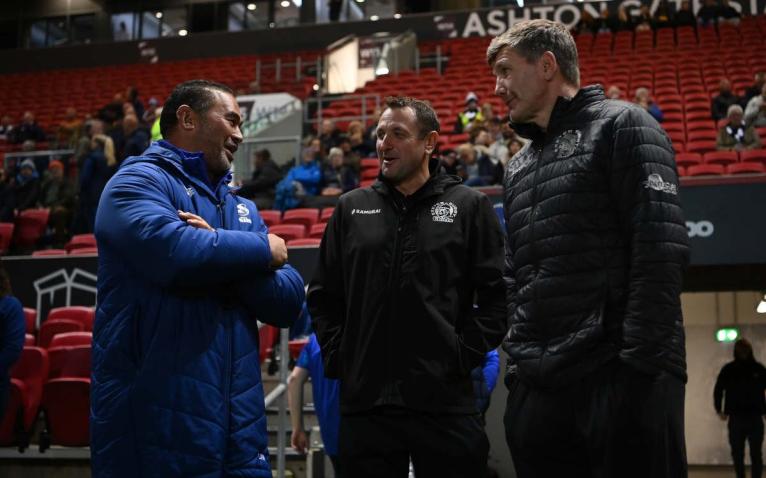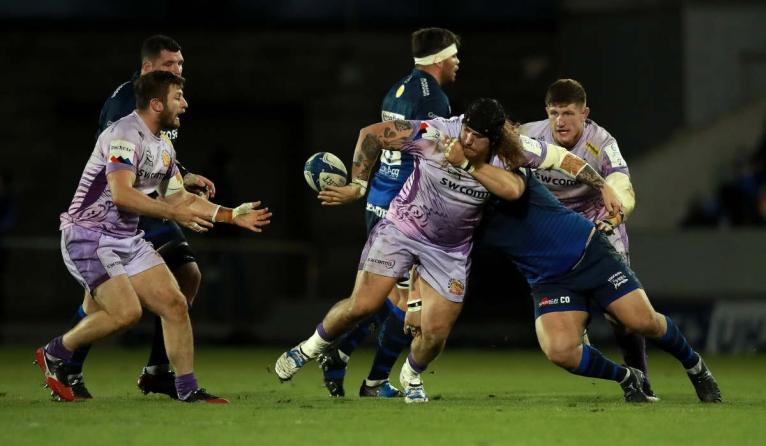Whenever chatter arises about a potential homegrown successor to Eddie Jones, it’s not long before Rob Baxter’s name is thrown into the mix alongside Steve Borthwick’s.
Plain-talking but polite, decorated yet humble (it’s easy to forget he has an OBE), Exeter director of rugby Baxter has a directness, an unflappability and a proven track record that makes him a worthy punt for international elevation.
But of late Baxter has been far more interested in reconfiguring the foundations of the club he has been involved with for 35 years than considering rugby’s dreaming spires at Twickenham.
So while Luke Cowan-Dickie, Jack Nowell, Sam Simmonds and Henry Slade have been in England camp for the autumn internationals, Baxter’s concerns remain very much in his own parish.
Quietly and in his typically unostentatious way, Baxter has been reviewing, revamping and renewing a club which he sensed was in danger of tipping into fruitless repetition and complacency.
The work of renewal began before last season was even over, with systematic interviews across the rugby department, and it continues now. And while the Chiefs reset remains a work in progress against a perilous financial backdrop, some new facets are beginning to show themselves.
And those new facets were needed.
By their own consistently high standards, Exeter had an arresting slump last campaign, missing out on making the Gallagher Premiership final for the first time in seven seasons.
Players, by their own admission, were irritating each other and, for a brief moment, a negative spiral looked like it might just take hold at a side which had been the standard bearers for hard-graft and upward mobility for over a decade.

Baxter sensed this towards the end of the last campaign and faced it head-on rather than putting his head in the Devonian sand and hoping it would pass.
Rather than seeking a solution through top-down diktat, Baxter has sought collaboration – taking the players with him. And the first thing he wanted them to do was to hit the pause button and reflect on what was working for the team – and what wasn’t.
“The important thing is that everybody stops,” says Baxter. “For me the biggest thing about moving forward, or restarting, or finding you next goal or ambition, or what you want to work hard for, is that you actually have to stop.
“You have to pause, and you have to have a little bit of thought and go, ‘Look, I’ve changed. For all kinds of reasons, I’m not the same. Things aren’t the same for me as they were five years ago. What are my new ambitions, what are my new aims? Have I changed the right way, the wrong way? Am I doing what I should have been doing five years ago?’”
Only two-and-a-half years ago Exeter did the double, becoming champions of both the Premiership and Europe. But Baxter knew that some of his long-established players were in danger of becoming a tad jaded and that a new formula was needed
Only two-and-a-half years ago Exeter did the double, becoming champions of both the Premiership and Europe. But Baxter knew that some of his long-established players were in danger of becoming a tad jaded and that a new formula was needed.
“We’ve actually got quite a lot of players involved here who have been here a long time and achieved quite a lot. And I think it’s really important that they feel there’s a bit of a fresh impetus and a way forward as well.
“A lot of what we’ve done has been done relatively collaboratively to create one thing, which is a bit of a feeling of a fresh start.”
The club’s much-talked-about rebranding was just one superficial aspect of that fresh start. Ahead of the new season the club ditched its increasingly controversial Native American-themed branding and switched to a logo featuring a Celtic chief from the Iron Age. But beneath the refresh of the club’s image was a Baxter-led refresh of the club’s culture, too.
The gym was refurbished, the players’ meeting rooms at Sandy Park were given a different feel, and Baxter stepped back from the day-to-day management of the coaching, leaving it to Ali Hepher. Beneath all that, however, was a fundamental change in how Baxter wanted to interact with his players – and in how he wanted his players to view him.
The elevation to director of rugby is usually associated with a more remote relationship to the players at a club. Not so with Baxter, who is now fulfilling a more informal, counsellor-type role with those on his roster.

Among those to have seen and benefitted from the change is prop Harry Williams, who says Baxter’s closeness is helping to fill a gap.
“I definitely feel connected to Rob as a player,” says the tighthead. “He’s probably taking more of a pastoral role, so I’ve seen more of him in that kind of light.
“His role isn’t based so much around the coaching and rugby aspect like in years gone by. When I came he was involved with the forwards and he was our defence coach whereas now all the coaching is done with the other guys. So where’s that extra time going? It’s going into speaking to players and that fills that void.”
Williams is frank about how grim things felt at times during the 2021-22 season.
“Last year everything seemed like: we can’t win a game, everything seems bad and everyone’s getting on each other’s nerves. Whereas this year’s the opposite’s taken place.
“Everyone’s enjoying each other’s company. In sport, in life, it’s very easy for things to go either way. It’s weird. When things are good or bad around the place they tend to get worse or get better at an accelerated rate.”
Scrum-half Sam Maunder agrees. “There’s enjoyment and positivity with everything that we’re doing at the moment,” he says. “That’s a massive step on from last year. We can all admit that last year was a tough year, but we’ve taken some big learnings and a lot of the boys have re-energised from last year which is really positive to see.”
To get that connection with players there’s not a process, there’s not a formula or situation you go through. It’s just about keeping an eye on people. Seeing when they’re up and when they’re down.
Rob Baxter
For Baxter himself, it is about forming a new bond with the players which not only changes the day-by-day ambience at Sandy Park but which makes the tough conversations easier.
“To get that connection with players there’s not a process, there’s not a formula or situation you go through,” he says. “It’s just about keeping an eye on people. Seeing when they’re up and when they’re down.
“I’m in far more informal situations with the players. That’s probably the easiest way to put it. Before, pretty much every situation was a relatively formal scenario where you’re preparing for a training session or preparing for a meeting or a game.
“I probably have more time now to sit down with the players and talk them through those whole scenarios around where they are. Before, when you’re doing contracts on top of some other stuff, sometimes it just has to be, ‘Look there’s some figures, we’ll talk about it later’. That’s not always the best way.”

On the field, the reset is resulting in some previously unheralded players stepping forward, and also some younger guns putting pressure on the established artillery.
Olly Woodburn, for many seasons a slightly-under-the-radar weapon for the Chiefs, is finally beginning to be spoken of in the terms that he deserves. Previously the winger was typically “dependable” and “reliable”, but now “dominant” and “classy” are more readily used to capture both his superb aerial work and his composed finishing.
Players within the club also feel that the arrival of former Bristol coach Omar Mouneimne as defence guru has reinvigorated the side when they are playing without the ball.
Pivotal at times in those defensive efforts has been emerging loose forward Richard Capstick, whose selection at times ahead of Montpellier-bound Sam Simmonds is itself an indicator of both a changing of the guard and a change of emphasis. The confidence shown by Baxter in motor-footed back three flyer Josh Hodge, 22, is another sign of the club’s evolution.
One thing that hasn’t changed at Sandy Park is the enthusiasm of chairman Tony Rowe, who continues to be a fist-pumping, cheering citizen of the sidelines rather than a remote duke of the boardroom
The Chiefs sit sixth in the Premiership table, two points off the play-off zone. Baxter, who played at Exeter as a colt from 1987 and is now in his 14th season at the club as a coach, knows there is still work to be done but has been cheered by his players’ shift in mindset.
“What’s refreshing for me is that we’ve managed to draw a line under anything that was holding us back and now it’s just about what we can achieve again,” he says.
“Most of what we’ve done for this season is to align with a feeling of freshness. That in itself is probably what has helped create the feeling of us moving forward rather than trying to catch up with where we were.”
One thing that hasn’t changed at Sandy Park is the enthusiasm of chairman Tony Rowe, who continues to be a fist-pumping, cheering citizen of the sidelines rather than a remote duke of the boardroom. Alongside Baxter’s more impassive demeanour they remain Exeter’s quintessential double act, guiding the club from the Championship to the top of the Premiership.
Just don’t ask Rowe about whether Baxter is the ideal English pick to replace Jones.


Comments
Join free and tell us what you really think!
Sign up for free